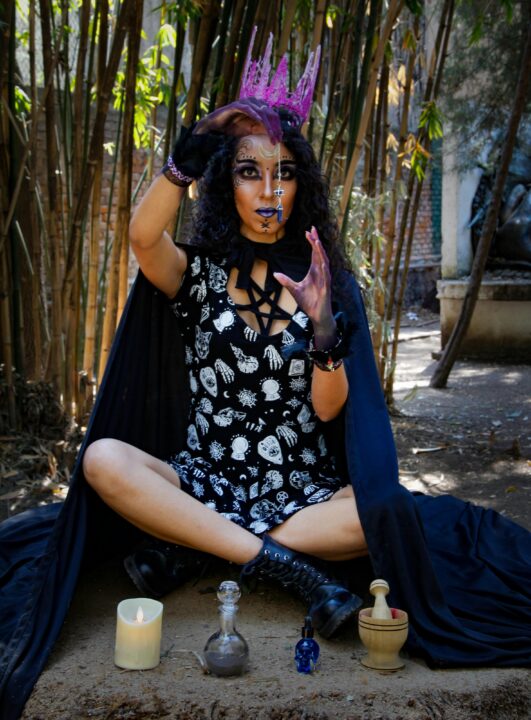Voodoo is known to be a religious spiritual practice that originated in West Africa and then developed in the Americas. It is mostly associated with dark magic and evil power. Whereby it is a complex and large practice that surpasses various rituals, ceremonies and beliefs.
This voodoo has created influence in the lives of many, notwithstanding its reputation and what it’s being said it stands for.
This article will give more details on the signs of Voodoo, its impact, presence, advantages and disadvantages on individuals and communities.
Signs of Voodoo

The signs of Voodoo are different because of the specific tradition and practice, and the common signs are:
- Veve
- Herbs and roots
- Candles and colors
- Drums and music
- Doll babies
- Possession
- Animal parts
- Rituals and ceremonies
- Altars
- Conjure Balls
- Magical Powders
- Sacred stones and minerals
- Spirit traps
- Voodoo dolls with pins
- Mojo bags
- Veve: There are sacred symbols used to be drawn on the ground in order to summon the spirits and ancestors.
- Herbs and Roots: These are various plants that can be used for healing, protection and spells.
- Candles and Colors: These are special and colorful candles used in the process of rituals, occasions and spells.
- Drums and music: The drumming and the music are used to summon the spirits and ancestors.
- Doll Babies: These are a few doll babies that are used to represent individuals for protection, spell-casting and healing.
- Possession: This is the part where practitioners become vessels for ancestors or spirits.
- Animal Parts: These are bones, feathers and many other countless animal parts you can find in their place; they are usually used for spells, protection and healing.
- Altars: sacred statues, symbols, sacred spaces with offerings, and symbols obeying ancestors and spirits.
- Conjure Balls: These are small balls with roots, herbs and other things that can be used for spellcasting and influence.
- Magical Powder: The powders are used for protection, spells, and healing and are made from minerals and herbs.
- Sacred stones and minerals: These are used in the case of connection, protection, and healing from ancestors and spirits.
- Spirit traps: These are devices used to capture spirit, which is used for protection.
- Voodoo dolls with pins: The dolls that are used for spellcasting and influence are made by inserting pins into particular areas.
- Mojo Bags: There are the small bags used for putting in herbs, stones and other things that are for protection, spellcasting and healing.
Signs of Voodoo Presence
1. Herbalism and Healing
The voodoo practitioners believe in the power of natural remedies and herbs to heal spiritual and physical problems.
2. Altars and shrines
Voodoo altars and shrines are made to honor deities, spirits, and ancestors. They are made of different objects, like drums, candles and other ritualistic items.
3. Weird Markings and Symbols
The Voodoo practitioners use various symbols and markings to interact and communicate with the spirits, ancestors and practitioners. These symbols might seem to appear in homes, public environments or individuals’ bodies.
4. Rituals and Ceremonies
Voodoo ceremonies are always performed to honor spirits, seek attention and protection, and manifest desires. These events may involve dance, music and offerings to the spirit.
Signs of Voodoo Influence
- Curses: Voodoo is mostly associated with curses, which are believed to bring nothing but misfortune to personalities.
- Dreams and Visions: The Voodoo practitioners believe that dreams and visions are messages that come from the ancestors.
- Unexpected Events: Strange occurrences, such as unexplained movements, changes in temperature, and unexpected and unexplained noises, may reveal information about Voodoo activity.
- Usual change and unexplained change in behavior: a sudden and unexplained change in behavior, such as withdrawal, mood swings, shouting, etc., indicates Voodoo influence.
- Hearing a noise or voice: Hearing voices or whispers, especially those coming from nowhere, may be a sign of Voodoo influence.
- Fear: A constant and unexplained feeling of fear or anxiety may be a sign of Voodoo influence.
- Finding Strange Things: Finding strange objects like dolls or charms in your environment may be just a sign of Voodoo influence.
- Usual Smell: Observing or noticing the usual smells or scents around your environment or space may be a sign of Voodoo influence.
Types of Voodoo
- Louisiana Voodoo
- Santeria
- Candomblé
- Hoodoo
- Vudu
- Rootwork
1. Louisiana Voodoo
This was developed in the southern United States, particularly in New Orleans. This form of Voodoo combines African, French, and native American influences. It’s mostly known for its use of charms, spells and herbs.
2. Candomblé
This was developed in Brazil, a religion that originated from Yoruba mythology. It laid emphasis on the worship of Orisha and the use of music, trance possession and dance.
3. Hoodoo
Hoodoo, also known as Conjure, is a kind of Voodoo that started in West Africa and emphasizes the use of roots, herbs and spell-casting.
4. Santeria
Santeria is a syncretic religion that matches Yoruba mythology with Catholicism. It is laid down on the worship of spirits and the use of rituals and sacrifices.
5. Vudu
This features the use of spells, charms, prosperity, and protection.
6. Rootwork
Rootwork was developed in the southern United States; it emphasizes the use of roots, herbs, spellcasting and protection.
Advantages of Signs of Voodoo
- Community Support: Voodoo helps foster a sense of community and support among practitioners, providing a network of intentional-minded personalities for guidance and encouragement.
- For Connection and Spiritual Growth: Voodoo provides a unique spiritual framework for connecting with the spirits, ancestors, and deities in order to keep promoting growth and development.
- Culture Preservation: Voodoo helps preserve African diasporic cultural heritage and traditions, promoting cultural appreciation and understanding.
- Adaptability: Voodoo’s history is a huge demonstration of resilience and adaptability, inspiring individuals to know how to deal with adversity and change.
- Uniqueness: Voodoo offers an outstanding and unique perspective on the world, encouraging individuals to think outside the box.
- Holistic Approach: Voodoo’s holistic approach to well-being and health is exceptional; it considers spiritual, physical and emotional aspects, offering a detailed approach to wellness.
- Personal growth and wellness: Voodoo teaches individuals to take responsibility for their lives and actions, making them more self-empowered.
- Healing and Protection: Voodoo never ceases to offer different kinds of healing and practices, such as rituals, to protect individuals from harm and help promote physical and spiritual well-being.
- Connection to nature: Voodoo places emphasis on the environment and nature, which promotes true and deeper appreciation and respect for the natural world.
- Guidance: The signs of Voodoo can give its practitioners wisdom and safety from the spirit and ancestors.
- Empowerment: Being able to understand the signs of Voodoo and its influence can empower you to control your life.
- Access to ancient knowledge: Signs of Voodoo can give you access to ancient knowledge you have never known about.
- Protection of Beloved: Having the signs of Voodoo helps you protect those you love and cherish from negative influence or control.
- Spiritual Enlightenment: Knowing more about these signs gives you deeper access to spiritual enlightenment.
- Increased Intuition: Having knowledge about the signs of Voodoo helps you grow and increase your intuition and psychic abilities.
By knowing and appreciating the advantages of Voodoo, we can get to know and understand the significance of Voodoo in the lives of those who practice it.
Disadvantages of Signs of Voodoo
- Lack of regulation: The lack of formal and centralized authority and regulations can lead to inconsistent practice, and this will make it so difficult for some to discern Voodoo from misleading practices.
- Fear and Intimidation: With the type of emphasis laid on the curses, spirits can create fear, which can lead to anxiety for some practitioners.
- Internal Conflicts: Many different voodoos and practitioners might have conflicting practices and beliefs that can lead to divisions and conflicts.
- Exploitation: Different people might just want to exploit Voodoo for personal gain, making use of its practices for manipulation and selfish power gain.
- Misconception: Voodoo is sometimes misunderstood and in the majority of cases, people associate it with dark magic, evil, and Satanism, which leads to stigmatization against practitioners.
- Spiritual Dependency: Overrelying on spirits and ancestors may lead one into spiritual dependency, diminishing personal agency and responsibility.
- Legal Persecution: In some counties, those practicing Voodoo might face legal persecution, which will force them to practice in secret or face discrimination.
Conclusion
In conclusion, the signs of Voodoo throw light on a fascinating imagination into a mysterious and often misunderstanding spiritual practice. Voodoo is diverse and each type has its own great story, history, practices and beliefs attached to it.
The signs of Voodoo also remind us that these spiritual practices are not rigid but rather dynamic, reflecting the needs, values and beliefs of the practitioners. By embracing this positive complexity, we can adapt and gain a deeper understanding of Voodoo and its significance in the lives of people who practice it.




